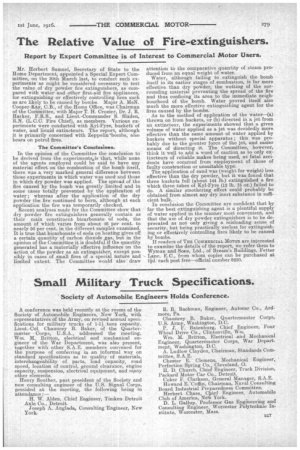The Relative Value of Fire-extinguishers.
Page 17

If you've noticed an error in this article please click here to report it so we can fix it.
Report by Expert Committee is of Interest to Commercial Motor Users.
Mr. Herbert Samuel, Secretary of State to the Home Department, appointed a Special Expert Committee, on the 30th March last, to conduct such experiments as might be considered necessary to test the value of dry powder fire extinguishers, as compared with water and other first-aid fire appliances, for extinguishing or effectively controlling fires such as are likely to be caused by bombs. Major A. MeN. Cooper-Kay, C.B., of the. Home Office, was Chairman of the Committee, with Major T. H. Crozier, Dr. J. R. Harker, F.R.S., and Lieut.-Commander S. Sladen, R.N. (L.C.C. Fire Chief), as members. Various experiments were conducted with Kyl-Fy-re, buckets of water, and liouid extincteurs. The report, although it is primarily concerned with Zeppelin 'bombs, also bears on petrol fires.
The Committee's Conclusions.
In the opinion of the Committee the conclusion to be derived from the experimentsiis that, while none of the agents employed could be said to have any material effect on the combustion of the bomb itself, there was a very marked general difference between those experiments in which water was used and those in which dry powder was applied. The spread of the fire caused by the bomb was greatly limited and in some cases totally prevented by the application of water ; whereas after the application of the dry powder the fire continued to burn, although at each application the fire was temporarily checked. Recent analyses made for the Committee show that dry powder fire extinguishers generally contain as their main constituent bicarbonate of soda, the amount of which varies from about 46 per cent. to nearly 56 per cent, in the different samples examined. It is true that bicarbonate of soda on heating gives off a certain quantity of carbon dioxide _gas, but in. the opinion of the Committee it is doubtful if the quantity generated has a materially effective influence on the action of the powder as an extinguisher, except possibly in cases of small fires of a special nature and limited extent. The Committee would also draw
attention to the comparative quantity of steam produced from an equal weight of water. Water,. although failing to extinguish the bomb itself in its earlier stages of combustion, is far more effective than dry powder, the wetting of the surrounding material preventing the spread of the fire and thus confining its area to the immediate neighbourhood of the bomb. Water proved itself also much the more effective extinguishing agent for the fires caused by the bombs.
As to the method of application of the water—(a) thrown on from buckets, or (b) directed in a jet from an extineteur, the experiments showed that a given volume of water applied as a. jet was decidedly more effective than the same amount of water applied by buckets without special apparatus ; this was probably due to the greater force of the jet, and easier means of directing it. The Committee, however, think it well to add a word of caution as to only extincteurs of reliable makes being used, as fatal accidents have occurred from employment of those of faulty construction or unsuitable type.
The application of sand was (weight for weight) less effective thaii the dry powder, but it was found that three buckets full (about 144 lb.) extinguished a fire which three tubes of Kyl-Fyre (12 lb. 15 oz.) failed to do. A similar smothering effect could probably be obtained from almost any dry inert substance in sufficient bulk.
In conclusion the Committee are confident that by far the best extinguishing agent is a plentiful supply of water applied in the manner most convenient, and that the use of dry powder extinguishers is to be deprecated as not only giving a misleading sense of security, but being practically useless for extinguishing or effectively controlling fires likely to be caused by bombs.
• If readers of TRE COMMERCIAL MOTOR are interested to examine the details of the report, we refer them to Wyman and Soca, Ltd., of Bream's Buildings, Fetter Lane, B.C., from whom copies can be purchased at 14d. each post free—official number 8250.




















